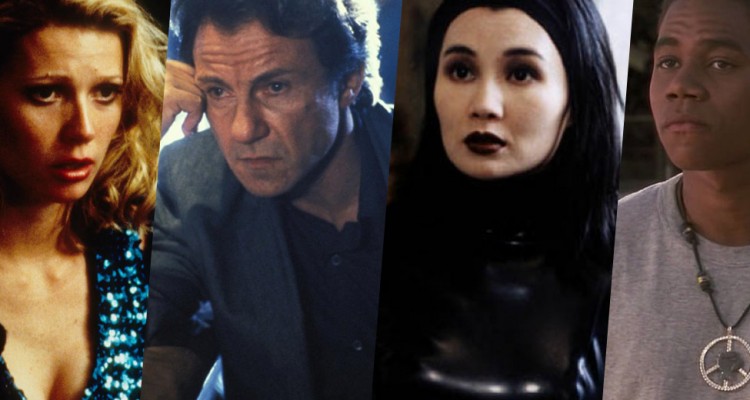
“The Death of Mr. Lazarescu” (2005)
As the first in a planned sextet of films detailing life in Bucharest, Cristi Puiu’s darkly humorous Eastern European concoction, “The Death of Mr. Lazarescu,” charmed international critics across many a festival, starting with Cannes, where it ended up winning the coveted Prix UCR. The story follows the titular character, a cantankerous old man (Ion Fiscuteanu) who is taken from hospital to hospital, his diagnosis being toyed with like a hot potato. Dry dialogue and drab deliveries punctuate the film as much as the stripped-down mise-en-scène shades the signature aesthetics of Romania’s cinematic surge. Simultaneously entertaining and harrowing, ‘Lazarescu’ is only preceded by Puiu’s own lesser-seen “Stuff And Dough” as the true beginning of the most fascinating and discussed movements in modern Eastern European cinema. And even after all these years, which have seen exceptional films by Puiu’s countrymen Corneliu Porumboiu and Cristian Mungiu, there’s a remarkable kind of insight and sense of IRL tragi-comedy about ‘Lazarescu’ that sets it apart and makes it one of the best films from the Romanian New Wave.

“Dogtooth” (2009)
Easily the most unlikely picture to be nominated for a Best Foreign Language Film Oscar in recent memory, “Dogtooth” turned the world on to Yorgos Lanthimos’ midnight-black humor, heralding a new and audacious voice of European cinema. With only a couple of titles to his name before this, it’s fair to say that Lanthimos was the discovery of the 2009 Cannes Film Festival, the conversation surrounding him almost managing to dwarf the Palme d’Or winner (Michael Haneke’s “The White Ribbon”). Utterly original, deadpan, dreamy, and wholly enigmatic, Prix UCR-winning “Dogtooth” skewers the myth of the perfect family and redefines “close-knit” as it follows the story of a husband and wife who keep their two children locked away from the outside world. It has, in the years since, become the Prime Mover for a lot of homagistic filmmaking, as well as having catalyzed the force of the “Greek Weird Wave.” But it is still just itself: a strange gemstone, washed in crisp whites, chiseled with specific perversity by DP Thimios Bakatakis.

“Elena” (2011)
Andrey Zvyagintsev‘s Jury Prize winner is a film that plows the poverty line in contemporary Russian society, navigated through the forlorn and survivalist nature of the titular character. Elena (portrayed with exquisite nuance by Nadezhda Markina) finds herself balancing on the class beam that divides the upper (husband Vladimir, played by Andrey Smirnov) from the lower (son Sergey, played by Aleksey Rozin) and makes a fateful decision that tethers us to the film’s world with invisible hooks. Zvyagintsev (the greatest working Russian direction right now, in my opinion) burst onto the scene with “The Return” in 2003, but then followed it up with the disappointing “The Banishment” (which competed for the Palme d’Or). “Elena” was relegated to the sidebar, which makes it something of a re-breakthrough for the Russian sophist, who followed it up with his brilliant opus “Leviathan.” Patient, thoughtful, and dexterous in how it weaves all cinematic elements around such a simple and minimal story, “Elena” pulsates with social commentary and ended up re-affirming Zvyagintsev’s master status.

“Hard Eight” (1996)
Its original release was fumbled, with precious few seeing Paul Thomas Anderson’s debut when it premiered at Sundance (under its original title “Sydney”). Few people saw it on release, either, but what reputation it has was in part restored by its selection in Un Certain Regard. An expansion of one segment of Anderson’s second short film, “Cigarettes & Coffee,” the breakout nature of “Hard Eight” is as understated as the performances contained within it (a stellar roundup including future Anderson regulars John C. Reilly, Philip Baker Hall, and Philip Seymour Hoffman). Even though he went to make what could be considered his genuine breakthrough soon after (“Boogie Nights,” of course), Anderson’s nascent style shows here, as in the moment in which he tries out the tracking shots for which he’d become justly famous after his next two films. Centering on Sydney (Hall), a mysterious low-stakes gambler, who befriends a seeming stranger in the despairing John (Reilly), “Hard Eight” also foreshadows the most prevalent dynamic in Anderson’s films: that of father and son. It’s still a filmmaker formulating his voice, but Anderson’s knack for being a natural-born actor’s director shines through as just one of the early signs of true greatness.

“Hearts Of Darkness: A Filmmaker’s Apocalypse” (1991)
Greatest documentary about the filmmaking process? If ‘Hearts of Darkness’ doesn’t fit the bill, it sure as hell comes closer than most. Eleanor Coppola, Francis Ford’s wife, accompanied her husband during the filming of “Apocalypse Now,” capturing unforgettable behind-the-scenes footage (Martin Sheen nervous breakdown, anybody?) of the now infamously hectic and maddening shoot. Decades later, George Hickenlooper and Fax Bahr edited the archival footage with brand-new interviews and turned out ‘A Filmmaker’s Apocalypse,’ as demoralizing of a testimonial for what making movies does to you on every level as it is an declaration of the stubborn artistic spirit. The doc went on to become so influential that it’s considered an essential key to truly understanding the greatness underneath the Vietnam War masterpiece — even getting parodied in “Tropic Thunder.” Wonderfully candid, showing the very best and the very worst of the insanity behind the filmmaking process, ‘Hearts of Darkness’ (right behind the following entry) is among the most memorable and influential documentaries to break out of the UCR.

